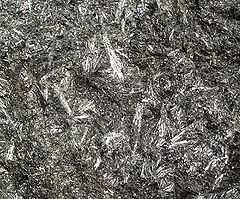Ludwigite
| Ludwigite | |
|---|---|
|
Radial aggregates of lustrous, black, metallic, acicular ludwigite crystals to 0.5 cm, from Alta Stock, Salt Lake County, Utah, USA. | |
| General | |
| Category | Borate mineral |
| Formula (repeating unit) | Mg2Fe3+BO5 |
| Strunz classification | 06.AB.30 |
| Crystal symmetry | Orthorhombic 2/m 2/m 2/m Space Group: Pbam |
| Unit cell | a = 9.26 Å, b = 12.26 Å, c = 3.05 Å; Z = 4 |
| Identification | |
| Formula mass | 195.26 |
| Color | Pitch-black, olive-black |
| Crystal habit | Massive - fibrous commonly in fanlike to felted aggregates |
| Crystal system | Orthorhombic |
| Cleavage | [001] Perfect |
| Fracture | Brittle - Conchoidal - Very brittle fracture producing small, conchoidal fragments. |
| Mohs scale hardness | 5.5 |
| Luster | Silky to submetallic |
| Streak | greenish black |
| Diaphaneity | Opaque, translucent in thin fragments |
| Specific gravity | 3.6 - 3.8 |
| Optical properties | Biaxial (+) |
| Refractive index | nα = 1.830 - 1.850 nβ = 1.830 - 1.850 nγ = 1.940 - 2.020 |
| Birefringence | δ = 0.110 - 0.170 |
| Pleochroism | X = Y = dark green; Z = dark reddish brown |
| 2V angle | Measured: 20° to 45° |
| Solubility | Slowly soluble in acid |
| Alters to | limonite |
| References | [1][2] |
Ludwigite is a magnesium-iron borate mineral: Mg2FeBO5.
Ludwigite typically occurs in magnesian iron skarn and other high temperature contact metamorphic deposits. It occurs in association with magnetite, forsterite, clinohumite and the borates vonsenite and szaibelyite.[2] It forma a solid solution series with the iron(II)-iron(III) borate mineral vonsenite.[1]
It was first described in 1874 for an occurrence in Ocna de Fier, Banat Mountains, Caras-Severin, Romania and named for Ernst Ludwig (1842–1915), an Austrian chemist at the University of Vienna.[1]
References

Ludwigite needles and sprays as inclusions in a peridot crystal from Sapat Gali, Kohistan District, Pakistan. Size 2.8 x 2 x 1.1 cm.
| Wikimedia Commons has media related to Ludwigite. |
